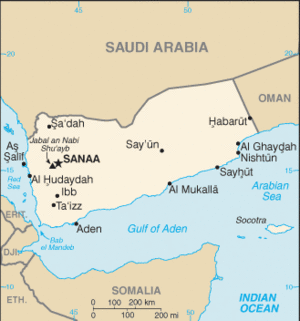Yemen
Yemen is a country in the Middle East, formed, in 1990, from North Yemen, a part of the Ottoman Empire, and South Yemen, a British protectorate that ended in 1967. North Yemen had existed as the Yemen Arab Republic, with a capital in Sanaa, and South Yemen as the People's Democratic Republic of Yemen, having Aden as its capital.
The country has a shoreline along the Red Sea, and shares borders with Saudi Arabia and Oman.
People
Yemenis, as opposed to other peoples of the Arabian Peninsula, do not have a nomadic tradition, but have long been settled in villages and towns. They are primarily Arab, although there are African elements on the coast.
When the former states of north and south Yemen were established, most resident minority groups departed. Most are Muslim, divided into:
- The majority Shafa'i school of Sunni Muslims, found in the south and southeast
- Shi'a Zaidi sect, found in the north and northwest. The Houthi resistance says it is fighting to stop marginalization of the Zaidi.[1]
Arabic is the official language, although English is increasingly understood in major cities. In the Mahra area (the extreme east), several non-Arabic languages are spoken.
Economics
Among the poorest countries of the Arab world, it has had average annual growth in the range of 3-4% from 2000 through 2007. Its economic fortunes depend mostly on declining oil resources, but the country is trying to diversify its earnings. Preliminary estimates for 2008 a GDP growth rate of 4.4 percent as compared to 4.2 percent in the previous year. "Higher oil revenues and some progress in tax collections also helped to reduce the fiscal deficit to 4.3 percent of GDP and the current account deficit to around 2 percent of GDP. Given that oil prices were very high during the first nine months of the year, the overall economic performance in 2008 is disappointing and underscores the difficult challenges faced by Yemen."[2]
In 2006 Yemen began an economic reform program designed to bolster non-oil sectors of the economy and foreign investment. As a result of the program, international donors pledged about $5 billion for development projects. In addition, Yemen has made some progress on reforms over the last year that will likely encourage foreign investment.
In November 2006, a World Bank-sponsored international donors conference held in London raised $4.7 billion for Yemen's development; the funds are to be disbursed between 2007 and 2010.
Government
While Yemen has formal governance mechanisms, the power of tribal leadership cannot be understated.
Executive
Yemen's head of state is the President of Yemen, who appoints the head of government and Prime Minister of Yemen as well as the vice president. The cabinet is appointed by the president with advice of the prime minister.
Ali Abdallah Salih, the incumbent President, had been president of North Yemen, and became national president when the two Yemens merged. He was reelected for a seven-year term on 20 September 2006, with 77.2% of the vote, and Faysal bin Shamlan receiving 21.8%. Bin Shamlan, who had held posts in the Salih government, died, of a long illness, in 2009. [3]
Ali Muhammad Mujjawar has been Prime Minister since 31 March 2007.
Security issues
- See also: U.S. policy towards Yemen
There is more than one internal security problem in Yemen, although Al-Qaeda in the Arabian Peninsula (AQAP) gains the most attention. The Yemen Post reports that a major conflict between the U.S. and Yemen is that Washington will not put the Houthi movement on its list of terrorists; it also criticized civilian casualties from a 17 December raid on AQAP. [4]
Houthi movement
The peace accord with the Houthi rebels, who of the Shi'a minority, signed in July 2008, is tenuous. [2] Houthis have crossed the border into Saudi Arabia and been attacked by the Saudis; they have asked for help from Iran. [1]
Al-Qaeda
Al-Qaeda in the Arabian Peninsula has attacked targets in the country as well as operating transnationally; a suicide bombing against Korean tourists in March 2009 was one indication of domestic security problems. [5]
References
- ↑ Jump up to: 1.0 1.1 Kristen Chick (11 November 2009), "Yemen's Houthi rebels get Iran assurance, ask Saudis to stop strikes", Christian Science Monitor
- ↑ Jump up to: 2.0 2.1 Yemen Economic Update, World Bank, Spring 2009
- ↑ "Yemen Ex-Presidential Candidate Dies", Yemen Post, 2 January, 2010
- ↑ Ali Al-Jaradi (28 December 2009), "Stance of U.S. administration on Houthi movement; Houthis and Al Qaeda mixed cards between Washington and Yemen", Yemen Post
- ↑ "Qaeda suicide bomber behind Yemen tourist attack", Reuters, 16 March 2009
